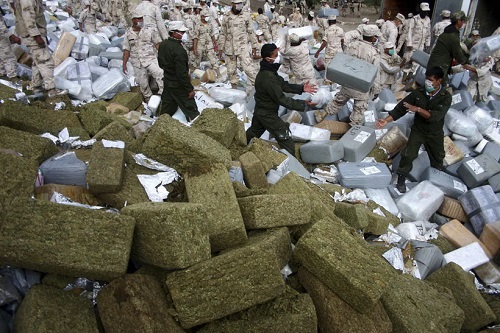Claudio Toledo photo
By
Ricardo Swire
“Justice” is defined by Meridian-Webster dictionary as “the maintenance or administration of what is just, especially by the impartial adjustment of conflicting claim or merited rewards or punishments.” Caribbean internal security intelligence officials view the November 7, 2017 Washington Office on Latin America (WOLA) report as verification of a double-standard justice system that prevails in regional neighborhoods’ security forces. The WOLA report noted that although Mexico reformed legislation in 2014 the country’s Armed Forces accountability has not improved.
Mexican soldiers accused of human rights abuses are treated with impunity, rather than investigated or prosecuted according to international standards. Between 2007 and 2012 Mexico’s Attorney-General’s (AG) Office processed five thousand cases, just four of which were convictions. From 2012 to 2016 the AG’s Office conducted five hundred and five criminal probes of reported offences committed by soldiers against civilians. Only three point two percent or sixteen military offenders were convicted. Caribbean internal security intelligence analysts identify Mexico’s 2014 “Tlatlaya Massacre” as proof of WOLA’s assessment.
According to one primary witness Mexican soldiers executed twenty-two residents in extrajudicial killings. Notwithstanding a military court acquitted six of the seven accused soldiers. Between 2012 and 2016 WOLA identified seven military personnel convicted for the “Cover up of Human Rights Violations/Destruction of A Corpse.” On Friday June 21, 2013 at 4:00pm Mexican soldiers assigned to the 97th Infantry Battalion clashed with drug cartel members in the Fresnillo country district, as Los Zetas and the Golfos Cartel battled for underworld control of territory. Two criminal characters were killed by military personnel. The remainder escaped via a dirt track leading to Canita de Filipe Pescador municipality.
In WOLA’s four year review Mexico’s civilian courts registered three soldiers guilty of “Enforced Disappearance” and three of murder. Two military men were convicted of causing injury and trespassing, one for rape. In Mexico’s unconventional conflict internal security forces execute covert counter-insurgency campaigns. Mexico’s politicians and civil powers, regardless of position or influence, have not been able to control drugs trafficking, which promotes internal security corruption and bloodshed.
Caribbean intelligence analysts recall Mexico’s 2014 scenario in which Federal Police detained a Lieutenant-Colonel and section of soldiers in Zacatecas state, a key drugs trade area. The military men later charged with seven extrajudicial civilian murders. Zacatecas district, located on the edge of Durango, is part of a popular smuggling corridor that connects to Jalisco state. Military personnel are accused of starting gun fights across Mexico, such as Michoacan state where an Ostula community child was killed and five residents wounded at a checkpoint. Ultra-modern Mexican drug traffickers focus more on fentanyl and opioids than cocaine, heroin or marijuana.
A recent American Drug Enforcement Administration (DEA) trend analysis indicated Mexican traffickers are trying to convert New York City to a Northeast fentanyl distribution base. Such Traffickers function with “quasi-corporate” complexity. The crime syndicate members described as “inconspicuous” with “a transient presence.” Mexican Cartel sales teams deliver mega quantities of fentanyl then disappear. For the first half of 2017 DEA agents assigned to NYC confiscated more than three hundred and fifty pounds of fentanyl, ten times more than 2016.
Caribbean internal security intelligence analysts are cognizant that Mexican Cartels recognize in America fentanyl’s profit margin is much greater than heroin. Therefore increased criminal interest in corrupting additional Mexican military personnel, especially soldiers stationed near the American border. On Monday August 21, 2017 soldiers attached to the Mexican Army’s Second Military Zone stopped and searched a truck and trailer, as the vehicle approached San Luis Rio Colorado near Yuma Arizona, USA. The truck was travelling from Mexico City to Tijuana and illegally transported one hundred and forty pounds of fentanyl. The drugs camouflaged behind sheet metal, inside the trailer’s insulated floor. Three bags with thirty thousand capsules containing fentanyl discovered.
Ricardo Swire
Ricardo Swire is the Principal Consultant at R-L-H Security Consultants & Business Support Services and writes on a number of important issues.



No Comments Yet!
You can be first to comment this post!